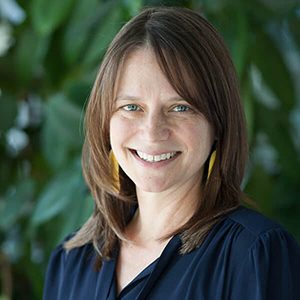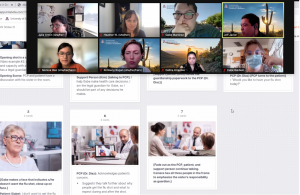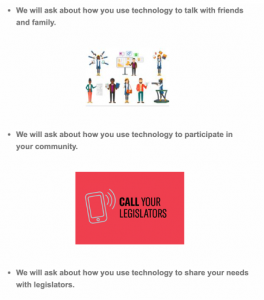Fairness First blog
Researchers voices in health equity
The Fairness First blog represents a space where researchers share with the broader community why health equity research matters to them, how do they connect to health equity, and what is the value of community engagement in the research process.
November 21, 2021
Health equity for people with intellectual and developmental disabilities with Heather Williamson
Associate Professor, Department of Occupational Therapy, Center for Community Health and Engaged Research
 Heather Williamson is an associate professor in the department of occupational therapy and the Center for Community Health and Engaged Research at Northern Arizona University. She worked as an occupational therapist with individuals with intellectual and/or developmental disabilities prior to going back to school to get trained as a public health researcher. She graduated with her doctor of public health (DrPH) from the University of South Florida in 2015 and joined NAU in 2016. When not teaching or doing research at NAU, she enjoys watching sports, hiking with her husband Chad, reading, catching up with family and friends on Zoom, and walking her dogs..
Heather Williamson is an associate professor in the department of occupational therapy and the Center for Community Health and Engaged Research at Northern Arizona University. She worked as an occupational therapist with individuals with intellectual and/or developmental disabilities prior to going back to school to get trained as a public health researcher. She graduated with her doctor of public health (DrPH) from the University of South Florida in 2015 and joined NAU in 2016. When not teaching or doing research at NAU, she enjoys watching sports, hiking with her husband Chad, reading, catching up with family and friends on Zoom, and walking her dogs..
Q. How would you describe your research and why it matters?
A. My research focuses on the health equity of adults with intellectual and/or developmental disabilities (IDD). Intellectual and developmental disabilities are disabilities diagnosed prior to the age of 18 and involve limitations in everyday activities and at times limitations in intellectual functioning. Common diagnoses included in IDD are Down syndrome, autism spectrum disorder, and cerebral palsy. Health equity means that every person has the chance to be healthy and well.
I use community-engaged approaches, meaning I work in partnership with community members, to design and complete my research. This means that the focus of my health equity work is led by the needs of the IDD community. Therefore, my research focuses on a variety of topics to improve the health equity of adults with IDD including: improving access to health care, improving access to and use of technology, improving access to jobs, and promoting self-advocacy of adults with IDD. My research often involves building and then evaluating programs, talking with adults with IDD to understand their health equity concerns, and understanding how policy can influence health equity.
Q. Tell us about a moment in your life when you decided, “This is the type of research I want to do!”
A. I worked with individuals with IDD as a health professional and saw the challenges they and their family member experienced in achieving their life goals due the ways in which the communities they lived in that did not support their success. I was frustrated, but I didn’t know how to go about making change. I needed to know how to evaluate what works, what didn’t work and what types of resources needed to be developed and what types of policies needed to be promoted. I determined that doing research, in particular, community-engaged research, would be the best way to raise awareness and promote change.
Q. What is the element of “unfairness” or “inequity” in the issue you are examining?
A. Health equity happens when every person can get what they need and can do the things that they want to support their health. Things in your life that can make you healthy are: getting together with family and friends; having a job; going to the doctor; eating healthy foods; exercising; living in a good home; and communicating with others.
My work focuses on addressing health equity as not everyone in our society has access to do the things to make them healthy. Adults with IDD, in particular, face challenges in their daily lives to access the things that would improve their health. This access is not because of their disability, but rather because our society has not fully supported all populations to achieve health equity.

Q. Based on your previous answer, how do you see your work helping to push the needle on this issue toward “fairness” or “equity”?
A. I see my work as advancing health equity as I work with community members to understand how we can support individuals with IDD in meeting their goals, and more importantly that the goals are something they want to achieve personally. Whether they want better access to health care, more positive experiences in receiving health care, to obtain employment, or they want to use technology more to engage in their communities.
In one of my projects, we are working to educate Native American women with IDD on the importance of being a healthy woman, advocating for their health, and to receive recommended cancer screenings. In this work, we heard from Native American women with IDD who told us that they had never been told that they should get cancer screenings. That is why our program is providing and evaluating a cancer screening education program specifically for Native American women with IDD. We also heard that health providers were not always respectful in their communications with individuals with IDD and so now we are working to build a provider education program on how to work respectfully with people with IDD in their decisions about health care. Funding for this work is provided by the Partnership for Native American Cancer Prevention and the Arizona Developmental Disabilities Planning Council.
In another project, I have been working with partners to address the digital divide for people with IDD who do not have access to or use technology as the same rate as their peers without IDD. We are currently distributing a survey to individuals with IDD about their access to and use of technology. We want to know how we could improve their access to technology and also how they use technology or want to use technology to make connections in their community. We are also helping with the evaluation of an advocacy program for adults with IDD. We will be doing focus groups with the adults with IDD who participated in the advocacy project about their experiences in the project and their experience with using technology. Ms. Tia Nelis, a nationally known and respected self-advocacy leader, is helping us with both the survey and focus groups.
Q. As a result of the COVID-19 pandemic, what impacts did you see emerge for adults with IDD?
A. During COVID-19, in discussions with community partners (The Arc of Arizona, Northern Arizona Community of Practice Transition Team), our group lamented how adults with IDD were losing jobs and that many did not have the luxury of working from home to maintain or obtain employment. We submitted a grant to the Arizona Developmental Disabilities Planning Council and were funded to implement and evaluate a technology skill building program for adults with IDD here in Arizona. One of our partners is, Daivergent, a technology skill building platform developed by Byran Dai for individuals with IDD.
Byran has a sibling with autism and was motivated to build the program seeing the limited opportunities available to his brother for employment. The project is also being overseen by a community advisory board which includes self-advocates with IDD, one is a current student in the Transition to Work program at Flagstaff Unified School District and the other is a staff member at Daivergent. Currently, fifteen adults with I/DD are working with a virtual support professional from Daivergent to receive individualized technology training and support. Individuals enrolled will access the Daivergent program for up to nine months. In the Daivergent program, each adult with I/DD is paired with a virtual support profession who acts as an online coach to complete the following activities: a strengths-based assessment and interest evaluations; video-based training modules for job readiness and social skills; and virtual work simulations of common technology-enabled jobs.
Each adult with I/DD will complete their personalized plan and Daivergent will work to connect them to prospective job roles and work opportunities tailored to their interests and skills. Evaluation data is being reviewed monthly by the project team and at the end of the program each adult with I/DD, any relevant support person, and the virtual support professionals will complete individual interviews about their experience with the program. We hope this project will provide us ideas on how to provide technology skills training for adults with IDD that we can share with the providers working to help facilitate successful competitive employment of adults with IDD, while also reducing the digital divide they experience.
Q. How do you want your research to make a difference or change in this world?

A. In the long term, it is my hope that my work will contribute to addressing the health equity of adults with IDD. Doing this work means that I will need to stay up to date on the current issues impacting this very diverse group of people. This means keeping up with the latest research, but more importantly staying up with the latest policy and practice needs in the communities in which we live.
In the short term, I also hope my collaborative work with community partners and students also leads to more advocates for people with IDD in our communities.
Q. What is one important lesson you’ve learned about yourself and this region through your research?
A. I have learned it always better to be a listener than a talker. I am a person who thinks out loud and sometimes I have to hold back and make sure that I am taking the time to really listen.
For more information on Williamson’s work, visit CHER’s page, “Health Equity for People with Disabilities.”
Back to the main Fairness First Campaign page.